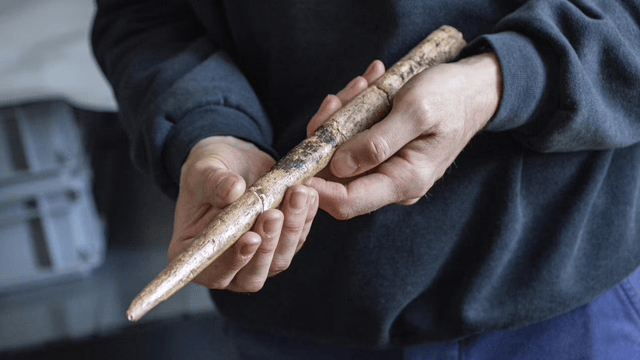
A hunting tool carved from gray whale bone, believed to be around 18,000 years old, was seen in Abbaye d'Arthous, France, in March 2021. AP Photo
Ancient Tools Found in Whale Bones
Scientists have discovered that people were making hunting tools from whale bones around 20,000 years ago. These tools, shaped into sharp points, helped early humans hunt animals like reindeer and bison.
Uncovering History
Experts found these bone tools more than 100 years ago in areas near the Bay of Biscay, between France and Spain. At the time, they couldn't tell exactly how old the tools were because many of them were broken into small pieces.
New Technology Gives New Answers
Thanks to improved scientific methods, researchers can now date these whale bone tools more accurately. They confirmed that the oldest ones are about 20,000 years old. The tools came from large whales like blue whales, fin whales, and sperm whales.
Humans and Whales: A Long Connection
One expert, who wasn’t part of the study, said this shows humans and whales have crossed paths for thousands of years.
Not Whale Hunters, But Scavengers
The scientists don’t believe these ancient people hunted whales. Instead, they likely found whales that had washed up on shore. Then, they used the bones, which are very strong and heavy, to make tools.
Living by the Sea
These discoveries suggest that early humans living near the sea made full use of what was around them. They likely fished, gathered shells, and used materials from the beach for tools and food.
Why These Finds Matter
In the past, scientists only had proof of whale bone tools that were about 5,000 years old. This new finding proves that people were using whale bones much earlier than anyone thought.
Challenges in Research
Studying ancient coastal life isn’t easy. Over time, rising sea levels have washed away many coastal sites. This makes it hard to find signs of early human life near old shorelines.
The Bigger Picture
The new study helps scientists understand how early people lived and survived. It shows how important coastal areas were to ancient human life. The tools prove that early humans were smart and resourceful.
Expert Opinion
“It’s one more contribution to the importance of coastal environments for human groups, even in this long past,” said Jean-Marc Petillon, one of the lead researchers.















